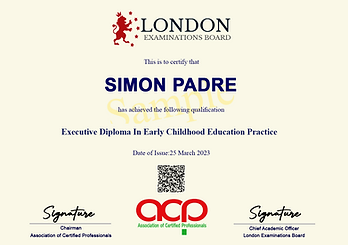PROGRAMME AIMS
- To provide a flexible and credit accumulation pathway to enable adult learners to upgrade their skills and knowledge in the early childhood learning and development centres.
- To provide adult learners who are engaged or plan to be engaged in early childhood education certificated learning which contributes to their career advancement.
PROGRAMME LEARNING OUTCOME
On completion of this Executive Diploma learners will be able to:
- Gain an understanding of various early childhood learning theories, models and approaches which can be applied in the teaching and learning of young children and to connect with children and families
- Apply appropriate teaching-learning strategies to positively influence each child’s development and learning.
REQUIREMENTS
An applicant may be admitted on the basis of evidence to suggest that he/she will be able to fulfill and benefit from the objectives of the programme and achieve the standard required for the award.
Summary of Entry Requirements
No prior knowledge is required. Applicants should normally be at least 16 years old and preferably with the following:
- Level 3 (QCF/RQF) Certificate;
- GCSEs at grade C or above; or
- Working adults
PROGRAMME SPECIFICATIONS
Module 1 – Early Childhood Learning And Teaching Strategies
Course Description:
The course consists of two parts: how children learn and generic strategies for teaching children. The first part focuses on the theories by Skinner, Bandura, Piaget, Vygostsky and Bruner and their explanation of how children learn. Also discussed is the issue of intelligence focussing on the multiple intelligence theory and brain development.
The second part examines the design and development of teaching strategies and appropriate learning activities for children in preschool, kindergarten and school age children. Focus is on developmentally appropriate practices, the thematic approach and strategies catering to individual differences.
Learning Outcomes:
Upon completion of this module, students would be able to:
- Compare the different theories explaining how children learn
- Discuss the different teaching-learning methods for children
- Design and develop developmentally appropriate practices (DAP)
- Implement teaching-learning methods that encourage child-centred discovery
- Create a supportive and conducive learning environment for young learners Indicative Content / Topics:
- Children brain development and learning • Various theories of learning including Skinner, Bandura, and Kohler etc
- Gardner’s Multiple Intelligence theory
- Developmentally appropriate practices • Inquiry-based, project-based and discovery learning
- Teaching methods encouraging critical, innovative and creative thinking
- Creating Learning environments that are child and family friendly, barrier free, inclusionary, and meet state regulatory requirements.
Recommended study time in notional hours
- 200 hours for each Module
Module 2 – Teaching Young Learner Mathematics
Course Description:
This course consists of two components: content knowledge about mathematics and the teaching of mathematics to young children. The content component seeks to update the mathematical knowledge of teachers and deals with understanding basic concepts & principles in measurement, numbers, geometry, and so forth. The teaching components focuses on mathematics teaching methods, mathematics activities, assessment in mathematics, and use of teaching aids.
Learning Outcomes:
Upon completion of this module, students would be able to:
- Understand the basic concepts, principles & laws in numbers, measurement, geometry, relationships & data management.
- Implement various teaching methods that will enhance mathematics understandings in young childre
- Adopt assessment methods that measure achievement in mathematics and identification of strengths & weaknesses
- Use various teaching aids to enhance the acquisition of mathematics concepts & principles among young children Indicative Content / Topics:
- Mathematics and children
- How children learn mathematics
- Numeration, geometry, and spatial sense
- Measurement and money
- Creative and fun mathematics teaching methods
- Assessment of children learning mathematics
Recommended study time in notional hours
- 200 hours for each Module
Module 3 – Teaching Young Learner Language
Course Description:
This module explores the first and second language acquisition and development of young children, including English Language Learners, with special emphasis given to the nature and function of both oral and written language, theories of first and second language acquisition, language and cognition, developmental stages in learning to talk, dialectical and linguistic differences, and partnering with parents to foster language and literacy development.
Learning Outcomes:
Upon completion of this module, students would be able to:
- Explore first- and second-language acquisition theories
- Trace first- and second-language development in young children
- Demonstrate various materials and methodology for presentation of an integrated first- and second-language program • Identify the process of oracy and literacy development
Indicative Content / Topics:
- Theories of first language acquisition
- Theories of second language acquisition
- Stages of language development for young children
- Bilingual language teaching and learning methodologies and integration
- Process of oracy and literacy development
- Assessing young children language development and performance
Recommended study time in notional hours
- 200 hours for each Module

